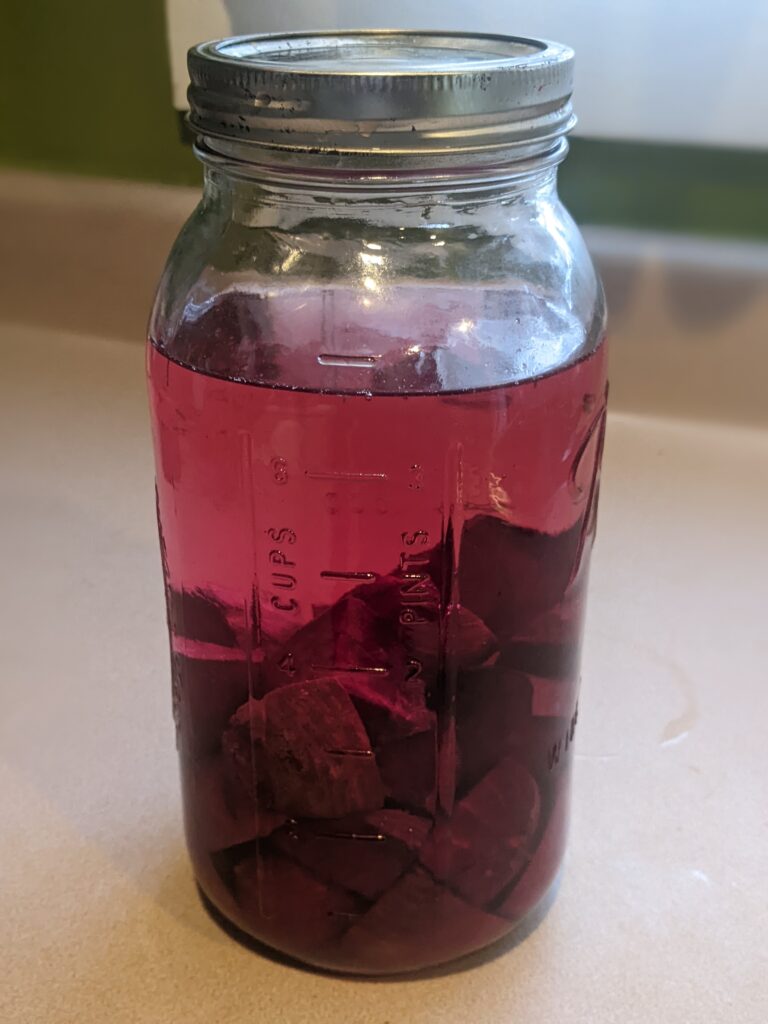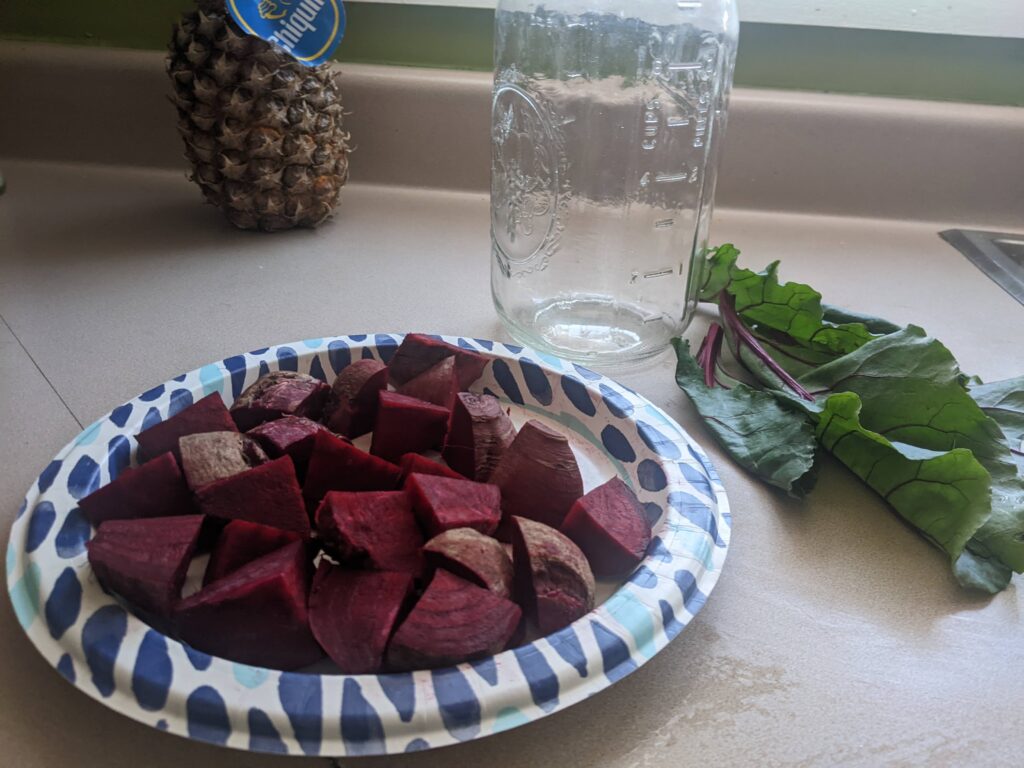Beet kvass is a fermented beverage that has been consumed for centuries in Eastern Europe, particularly in Russia and Ukraine. It is made by fermenting beets with water, salt.
Historically, beet kvass was used as a digestive tonic and blood cleanser, as well as a remedy for various ailments such as constipation and liver problems.
Beet Kvass Can Improve Your Gut Health
With all the recent studies, we now all know the connection of gut health to our immune system and general health and the importance of probiotics. Beet Kvass is rich in probiotics and beneficial enzymes, which can improve gut health and digestion. It also contains vitamins and minerals such as vitamin C, iron, and potassium, and has been shown to have anti-inflammatory and antioxidant properties.
Your beet probiotic drink is made by using a process called lacto-fermentation. All you need for this fermentation process are three ingredients: salt, your choice of veggie, and water. That’s it. No other equipment is needed, aside from your glass storage jar.
How Does Lacto- Fermentation Work
Salt plays an important role in the lacto-fermentation process. When added to your vegetables, salt helps create an environment conducive to the growth of beneficial lactic acid bacteria, while inhibiting the growth of harmful bacteria.

It’s important to note that too much salt can inhibit the growth of beneficial bacteria and lead to a less desirable flavor. The proper amount of salt will vary depending on the specific recipe and the type of food being fermented.
Recipe for Beet Kvass
Making beet kvass at home is simple and requires only a few ingredients. This recipe uses salt (also considered a brine) to begin the fermentation process. Be sure to use sea salt or Himalayan pink salt. Most table salts contain additives such as anti-caking agents and added iodine. For this reason, table salt is not recommended for fermenting.
Here’s the basic recipe to get you started:
Ingredients:
- 2-3 medium-sized beets, peeled and chopped into small cubes
- Cut into 1-inch cubes. You don’t want to grate them, as this will release too much sugar. Also, If you’re using organic beets, you don’t need to peel them, as the skin contains many bacteria that will help drive the fermentation. If using conventionally grown beets, it’s best to peel to get rid of pesticide residues. Remember to use a cutting board, or paper plate as the beets can stain your countertops.
- 1 tablespoon sea salt or pink Himalayan salt
- Filtered water
Instructions:
- Sterilize a ½ -gallon jar.
- Add the chopped beets in the jar and fill it with filtered water, leaving about an inch of headspace.
- Add the salt to the jar and stir well.
- Cover the jar with a tight-fitting lid and let it sit at room temperature for 2-3 days, or until the kvass has a slightly tangy taste and a deep red color.
- You can strain the kvass through a fine-mesh sieve, reserving the liquid and discarding the solids. I prefer not to toss the remaining beets but keep the leftover beets to eat. After all, waste not, want not.
- Refrigerate your kvass.

The kvass will continue to ferment in the refrigerator. Research shows that when refrigerated, lacto-fermented beet kvass retains its antioxidant powers for as long as 30 days. Please DO eat the remaining beets.
Beets Are Nutrient Dense
Beets are by themselves a nutrient-dense vegetable. Fermenting your beets rather than eating them raw gives you all the health-boosting benefits of raw beets listed below, plus the beneficial bacteria and enzymes that result from fermentation.
- Fiber: Beets are a good source of fiber, which is important for digestive health and helps promote feelings of fullness.
- Folate: Beets are an excellent source of folate, a B-vitamin that is important for cell growth and development.
- Vitamin C: Beets are a good source of vitamin C, which is important for immune function and helps the body absorb iron.
- Potassium: Beets are a good source of potassium, an essential mineral that plays a key role in heart health and blood pressure regulation.
- Iron: Beets contain iron, a mineral that is important for the production of red blood cells and oxygen transport in the body.
- Betaine: Beets contain betaine, a compound that has been shown to have anti-inflammatory and antioxidant properties.
- Nitrate: Beets are a rich source of nitrate, which can be converted to nitric oxide in the body and may help improve blood flow and oxygen delivery to tissues.
What are the benefits of fermented foods?
Fermented foods have been a part of human diets for thousands of years and are known for their various health benefits. You can also ferment other veggies such as carrots, cucumbers, cabbage, cherry tomatoes, to name a few. Here are some of the key benefits of fermented foods:
- Improved Digestion: Fermented foods are rich in probiotics, which are beneficial bacteria that help promote a healthy balance of microorganisms in the gut. This can improve digestion and reduce symptoms of digestive disorders such as diarrhea, constipation, and irritable bowel syndrome.
- Enhanced Nutrient Absorption: Fermentation can break down food components, making them easier to digest and increasing the bioavailability of certain nutrients, such as B vitamins, vitamin K2, and minerals like iron and zinc.
- Boosted Immune System: Fermented foods can boost the immune system by increasing the number of beneficial bacteria in the gut. This can help the body fight off infections, reduce inflammation, and improve overall immune function.
- Improved Mental Health: The gut-brain axis is a connection between the gut and the central nervous system, and research has shown that a healthy gut microbiome is essential for good mental health. Fermented foods can help maintain a healthy gut microbiome and reduce symptoms of depression, anxiety, and other mental health disorders.
- Reduced Risk of Chronic Diseases: Fermented foods are associated with a reduced risk of chronic diseases such as obesity, type 2 diabetes, and heart disease. The beneficial bacteria in fermented foods can reduce inflammation and improve insulin sensitivity, which can help prevent and manage these diseases.
In summary, incorporating fermented foods into your diet can be a great way to improve your gut health and overall well-being.
Resources
https://www.ncbi.nlm.nih.gov/pmc/articles/PMC4517037/
https://www.nccih.nih.gov/health/probiotics-what-you-need-to-know


Recent Comments